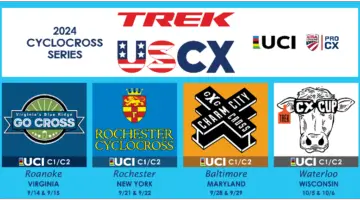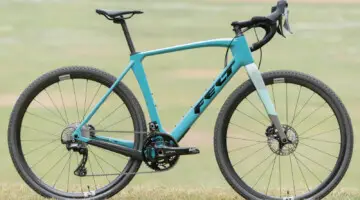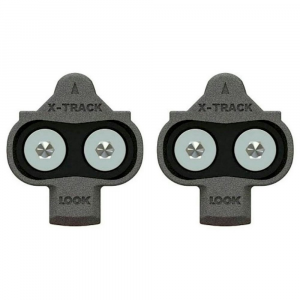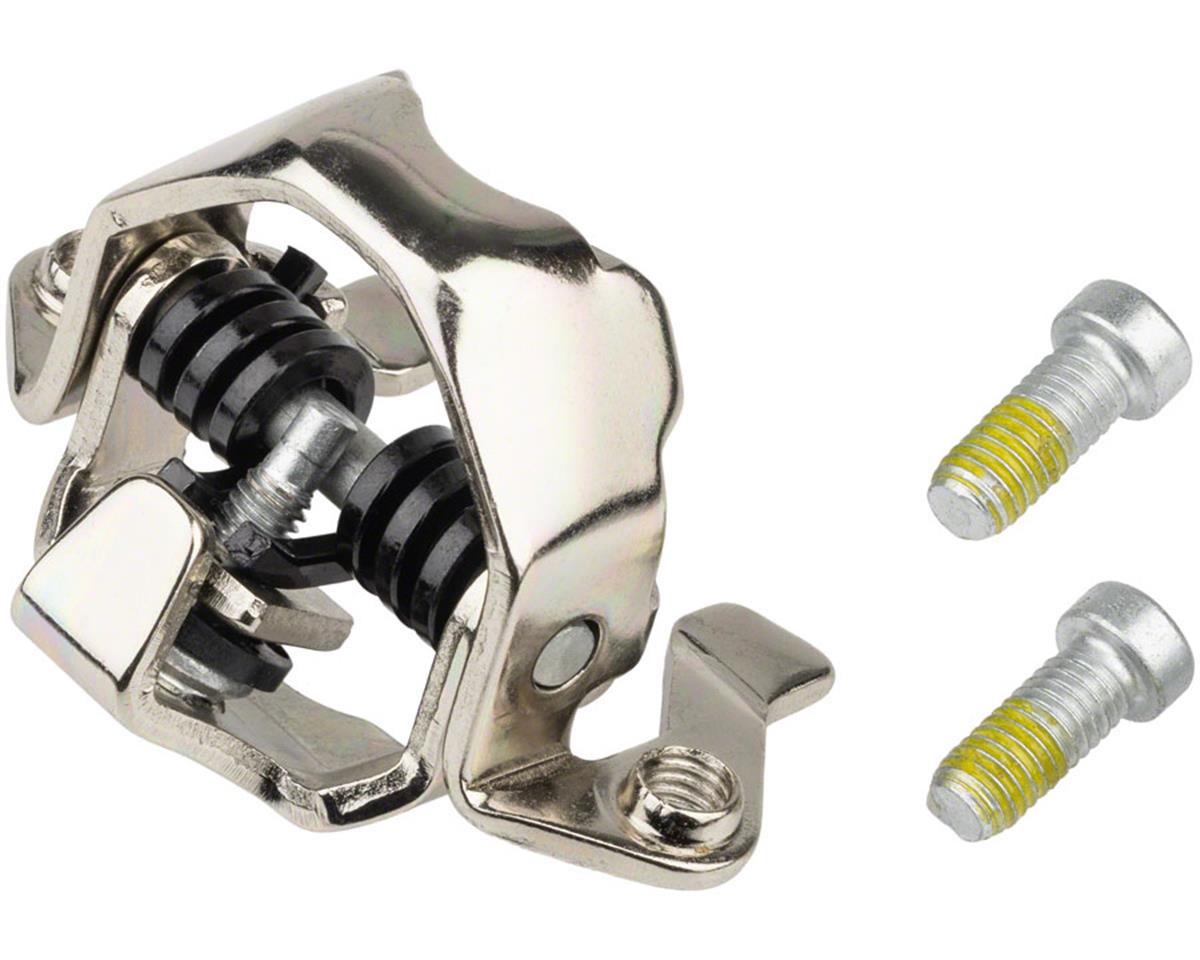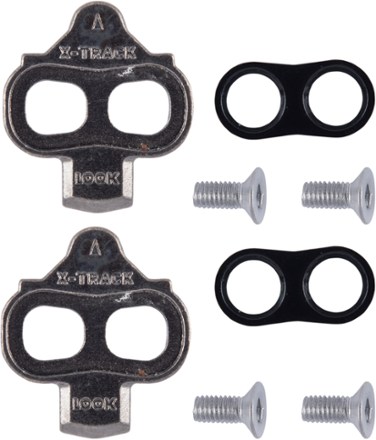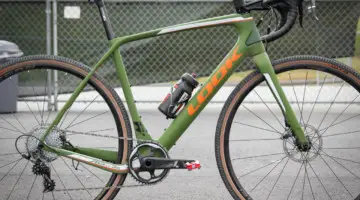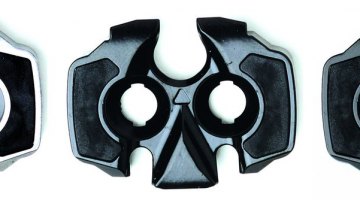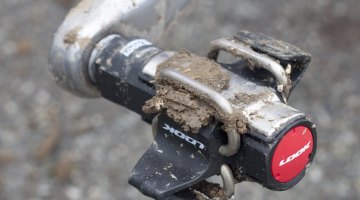Look Cycle has been a pioneer in cycling pedals. It took its popular ski binding technology and adapted it for road cycling, and soon found Tour de France champions including Bernard Hinault and Greg Lemond shedding toe clips in favor of clipping in.
While Shimano is credited by many as inventing the mountain bike version of the clipless pedal with its timeless M737 pedal unveiled in 1990, Look brought its single-sided offroad pedal to market well before Shimano.
Since then, the two companies have taken dramatically different approaches to off-road pedals. Shimano has kept its cleat and retention mechanism basically the same, save for infamous Shimano M858 pedals. You can buy an SH-51 cleat that works with both the original M737 as well as with today’s M9100 XTR SPD pedal.
Meanwhile, Look has, by our count, gone through eight major designs, the last six with cleats not compatible with its predecessor. Last season, it unveiled the dual-sided X-Track pedal, the 8th variant over the last 30 years.
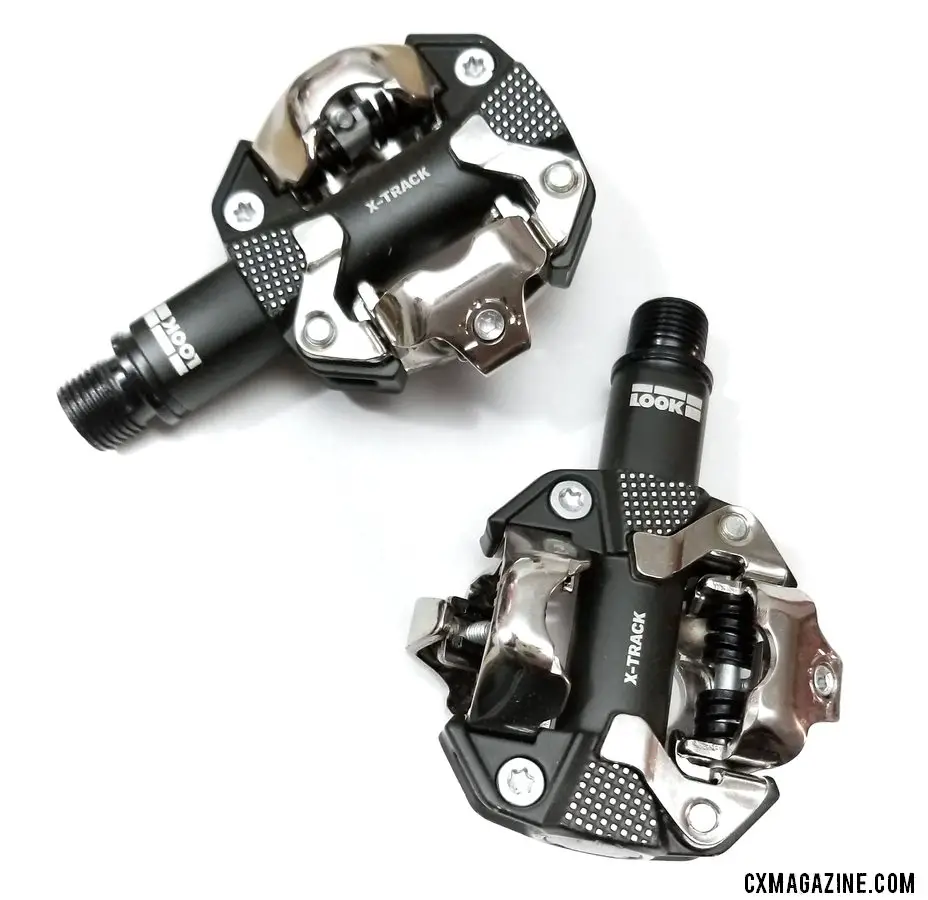
The Look X-Track mountain bike / cyclocross SPD-compatible clipless pedal. © A. Yee / Cyclocross Magazine
Here’s a brief history of Look offroad pedals, based on our memory.
- the Look ATB, a 1985 version of the road clipless pedal with a grippy backside
- the MP90/TP93, a more aggressive version of the ATB still available on eBay
- a Shimano-like dual-sided pedal compatible with two-bolt “SPD” style cleats with a large platform (the S2R Moab and S2 Nevada models, a favorite of Tinker Juarez)
- the slimmer elastomer-based SL3 dual-sided pedal, perhaps inspired by Onza
- a licensed Crankbrothers “Eggbeater” design 4×4 pedal
- the light and mud-clearing Quartz
- the curvy, Time ATAC-like two-bar-based S-Track
- the latest Shimano SPD-compatible X-Track
The latest pedal, the X-Track, is aimed at mountain bike racers, cyclocross racers and gravel cyclists, and Look had none other than Wout van Aert prove that the pedal was up for world-class racing and mud.
We’ve been clipping in and out of the X-Track and X-Track Race Carbon pedals since last cyclocross season, and have our full review for readers today.
Why a New Design?
With such a diverse collection of pedal iterations, I had to ask Look Cycle representatives why stray from the S-Track pedal design? Look stopped production of the S-Track pedal, explaining, “It was a really good product but we didn’t meet the success we expected.”
We found the S-Track to be stable, but the shims and lack of spring tension adjustment kept it from being perfect. Look seems to agree, telling Cyclocross Magazine that “the reasons were diverse” behind the S-Track’s demise. “It was a high technical product—maybe a little too much—which matches mainly expert riders requirements.”
So after creating its first two-sided offroad pedal in the style of Shimano, and then offering designs similar to Onza, Time and Crankbrothers and then two proprietary designs, the French company is back to a Shimano SPD design. This time it’s not only similar, but completely compatible.
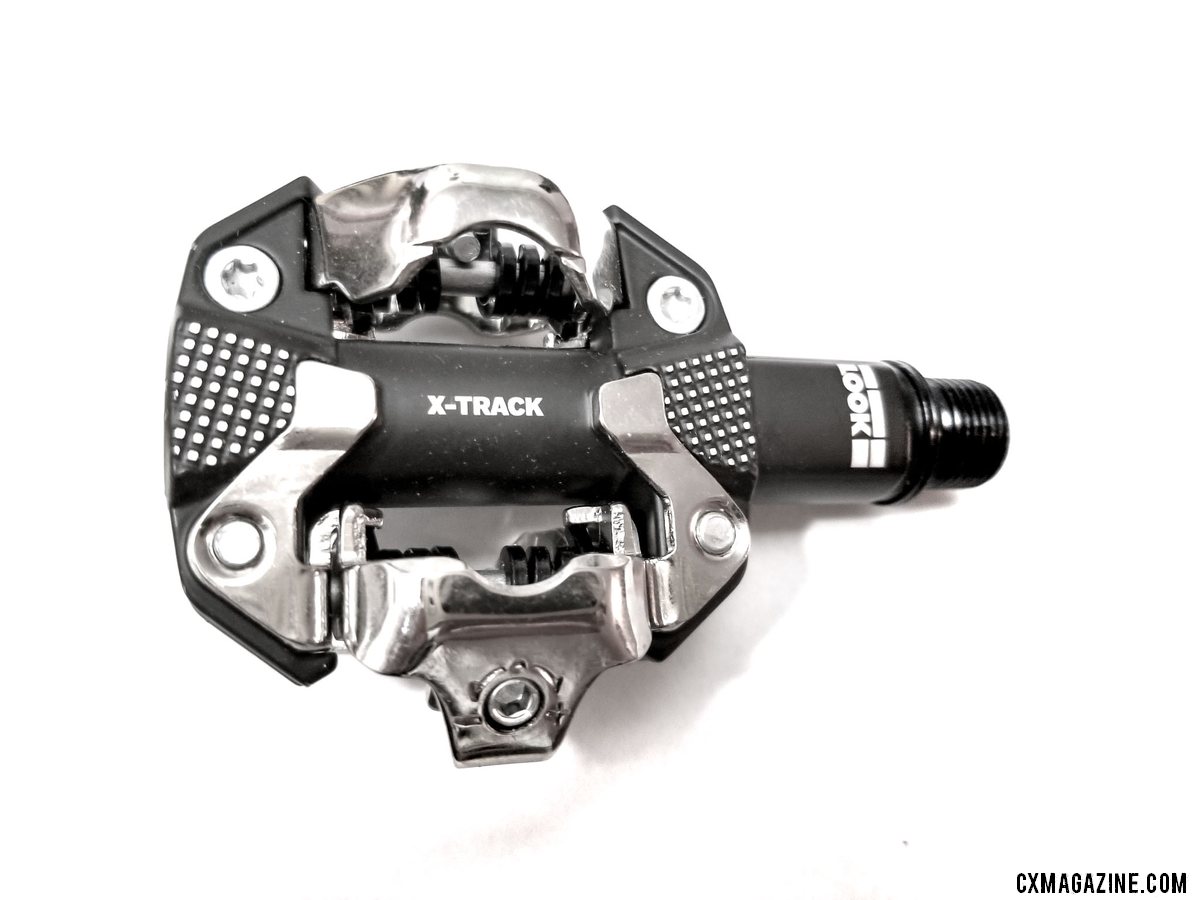
The Look X-Track mountain bike / cyclocross SPD-compatible clipless pedal. © A. Yee / Cyclocross Magazine
“We defined the X-Track to fit every kind of rider,” Look said. That rider includes current Shimano SPD pedal users.
Inspecting Four Levels of X-Track:
Look appears genuine in its hope to attract every kind of rider, offering the cross country version of its pedal in four levels and price points:
- The $60 X-Track
- The $90 X-Track Race
- The $130 X-Track Race Carbon
- The $270 X-Track Race Carbon Ti
As you might have already guessed, as the price goes up, the materials change and the weight comes down. I tested a set of X-Track and X-Track Race Carbon pedals. For $70 more, you get about 41 grams of weight savings. The flagship model pairs a titanium axle for another 41 grams of weight savings, at a $140 premium.
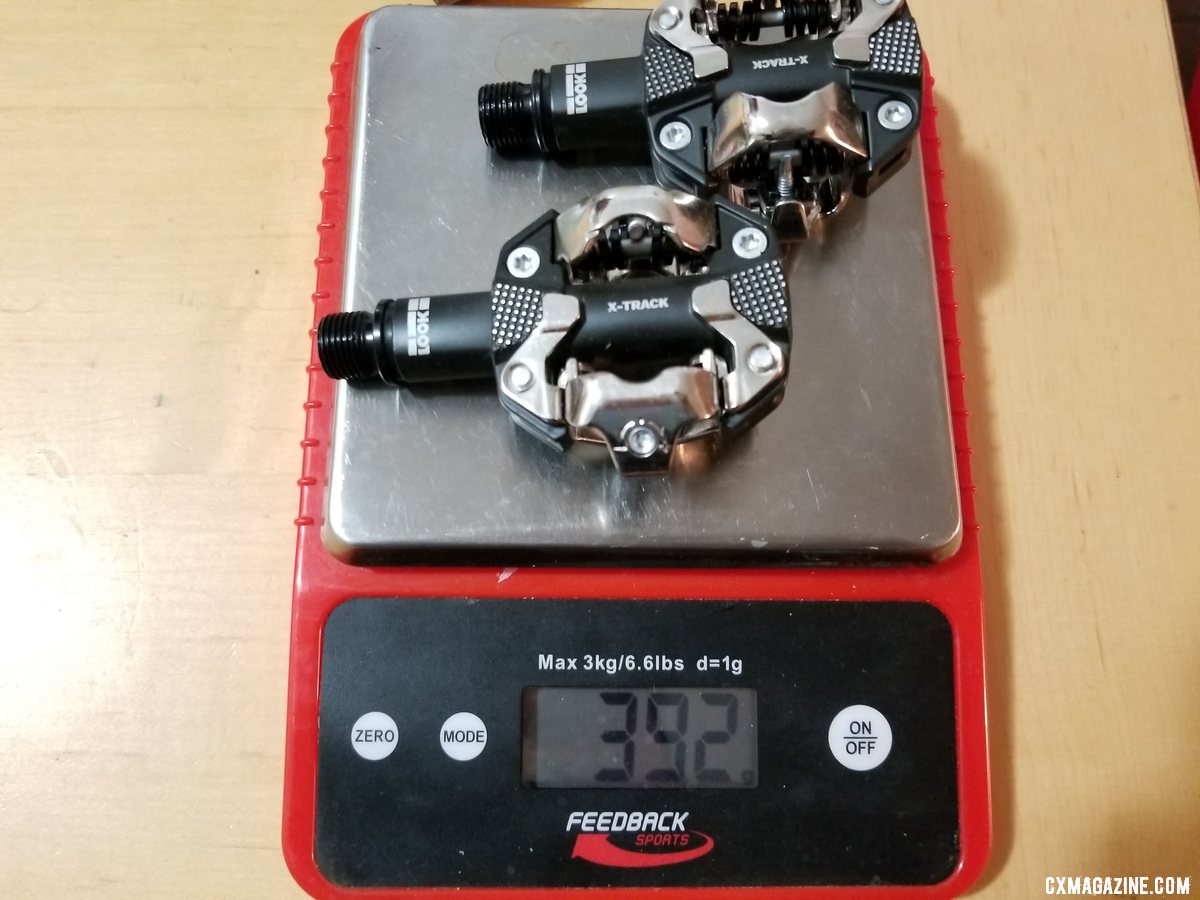
The most affordable Look X-Track mountain bike / cyclocross SPD-compatible clipless pedal tips the scales just shy of 392 grams. © A. Yee / Cyclocross Magazine
Our X-Track model weighed 392 grams, while the X-Track Race Carbon was 351 grams.
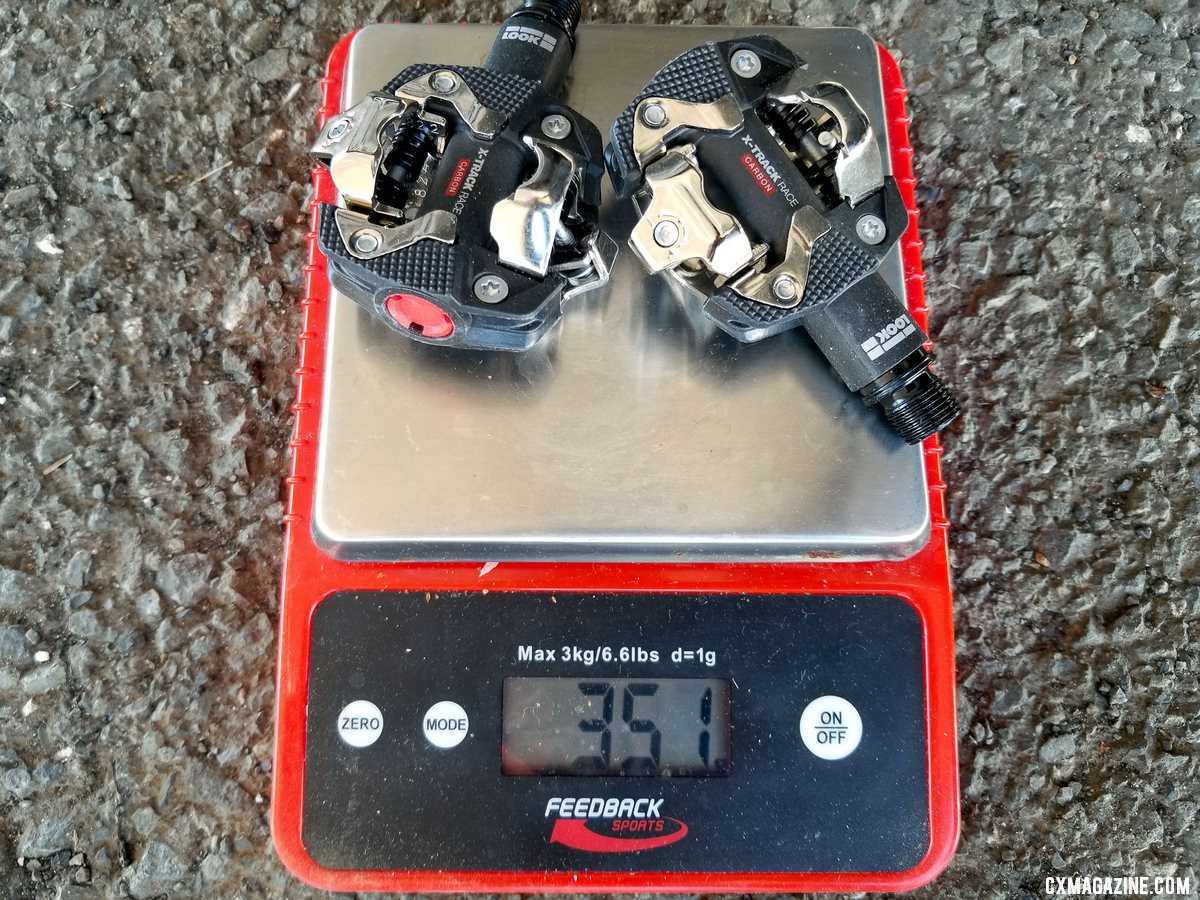
The Look X-Track Race mountain bike / cyclocross SPD-compatible clipless pedal sheds 41 grams over the standard X-Track. © A. Yee / Cyclocross Magazine
For the weight weenies, that’s 43 grams heavier than the $149 Ritchey WCS XC pedal and 44 grams heavier than the steel axle $110 Xpedo CXR pedal, both of which are also Shimano SPD compatible. They’re also about 30 grams heavier than the latest $179 M9100 XTR pedal from Shimano.
All models of the X-Track offer the same surface area, spring tension range and contact points. Look boasts the X-Track’s 515 mm² of surface area is the best in its class.
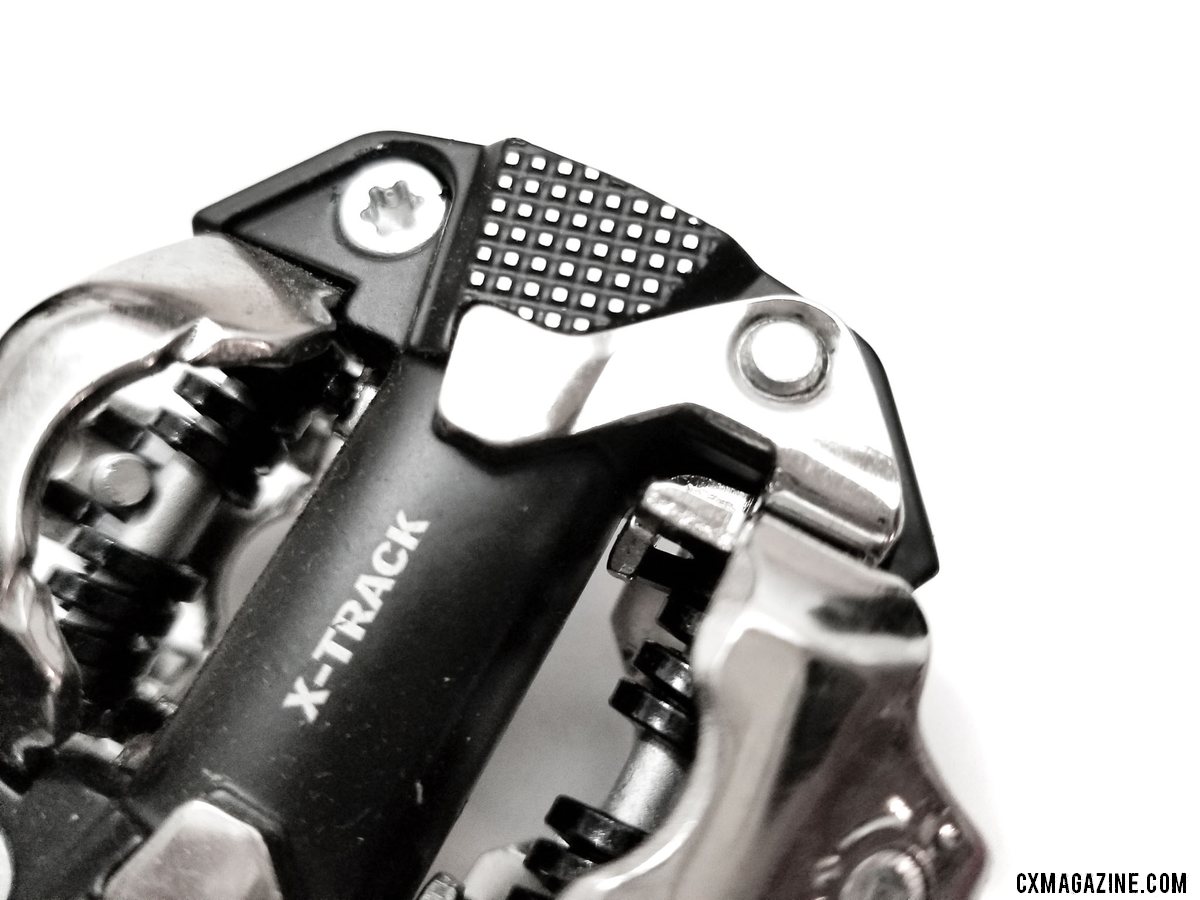
The Look X-Track mountain bike / cyclocross SPD-compatible clipless pedal offers a wide stance and texture for grip. © A. Yee / Cyclocross Magazine
If the X-Track Race’s contact points aren’t enough, Look offers the X-Track EnRage, its answer to Shimano’s larger trail SPD pedals. That body comes in three levels, the EnRage, EnRage Plus and EnRage Plus Ti.
For the fashion-conscious, the entry-level X-Track comes in both a dark grey and a red that reminds us of Look’s old SL3 model.
The stack height with cleats is listed at 16.8mm.
What about the guts? There are inboard bushings and two outboard cartridge bearings. If you unscrew the (sadly plastic, perhaps inherited from the S-Track) cap and 8mm bolt, you can pull the axle out. It’s not the durable loose ball setup used by Shimano that you can repack, but it’s easier to service. Although the pedal was unveiled in late 2017, as of March 2019, Look said axles and bearings are “in the pipe and should be [available] in the next few months.” So they should be available now, or soon.
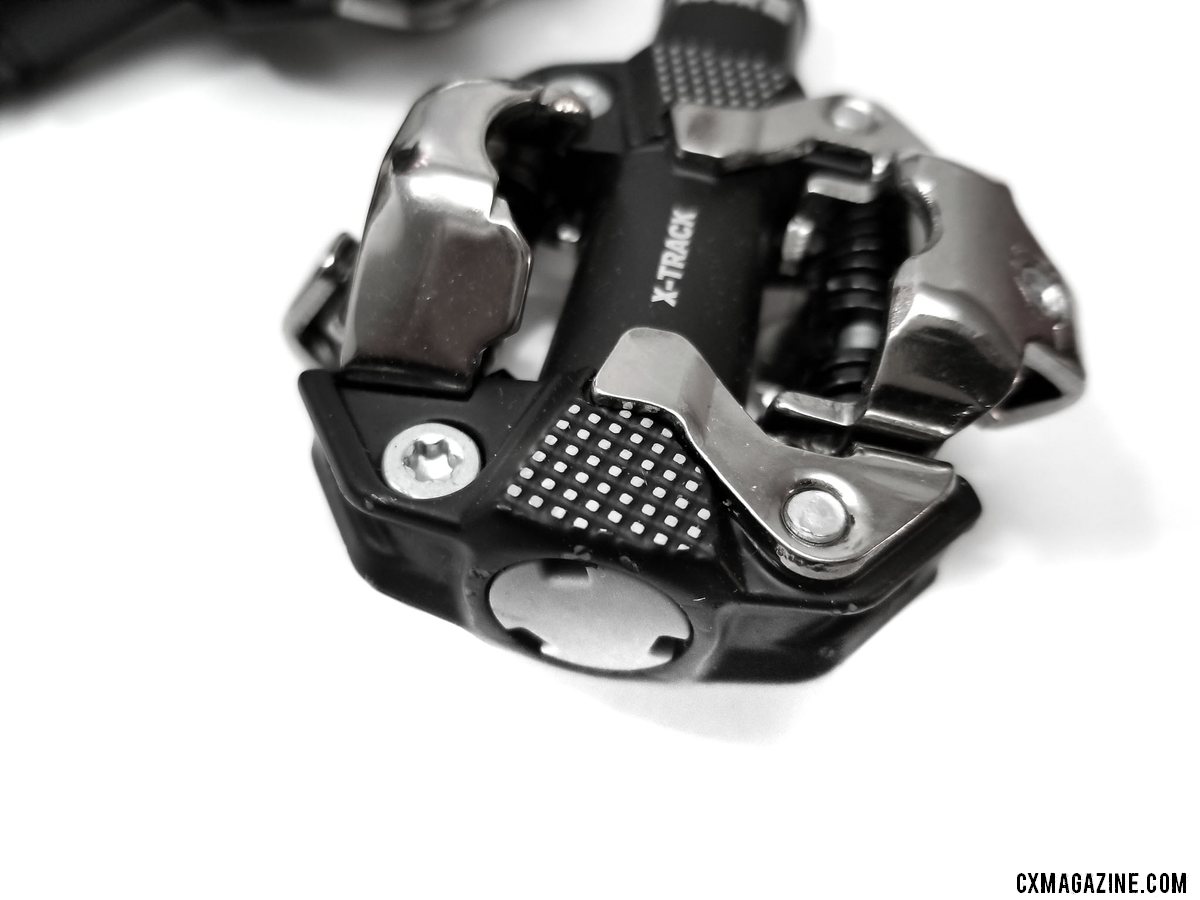
The Look X-Track mountain bike / cyclocross SPD-compatible clipless pedal has two bearings and a bushing behind the plastic cover. © A. Yee / Cyclocross Magazine
While pulling out the pedal spindle is easy, swapping it out for another length is not. Unlike with Shimano’s M9100 pedal, just one spindle length is available.
One small detail that goes unnoticed by many is that Look advertises the X-Track as offering 6 degrees of float, while Shimano SPD pedals list just 4 degrees of float. Look says it ends up with more float due to subtle changes in the its cleat compared to a Shimano SH-51 cleat, as well as in the “nose” (or claw) of the pedal.
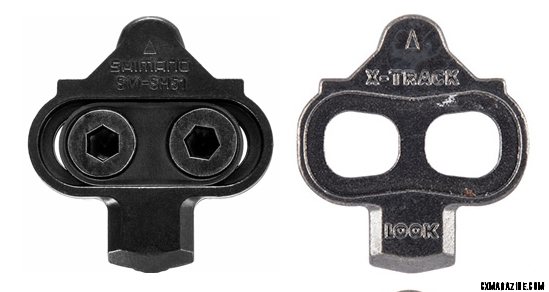
Except for the widest area, which does not impact clipping in/out, the X-Track cleats are nearly identical to a Shimano SPD cleat but offer more float. The Shimano cleats work fine with the X-Track pedal.
Look also offers an alternative cleat. Just as Shimano offers its SH-56 multi-release cleat, Look has an Easy X-Track cleat that does what its name suggests, and allows release by rolling your foot off the pedal. I did not test this cleat.
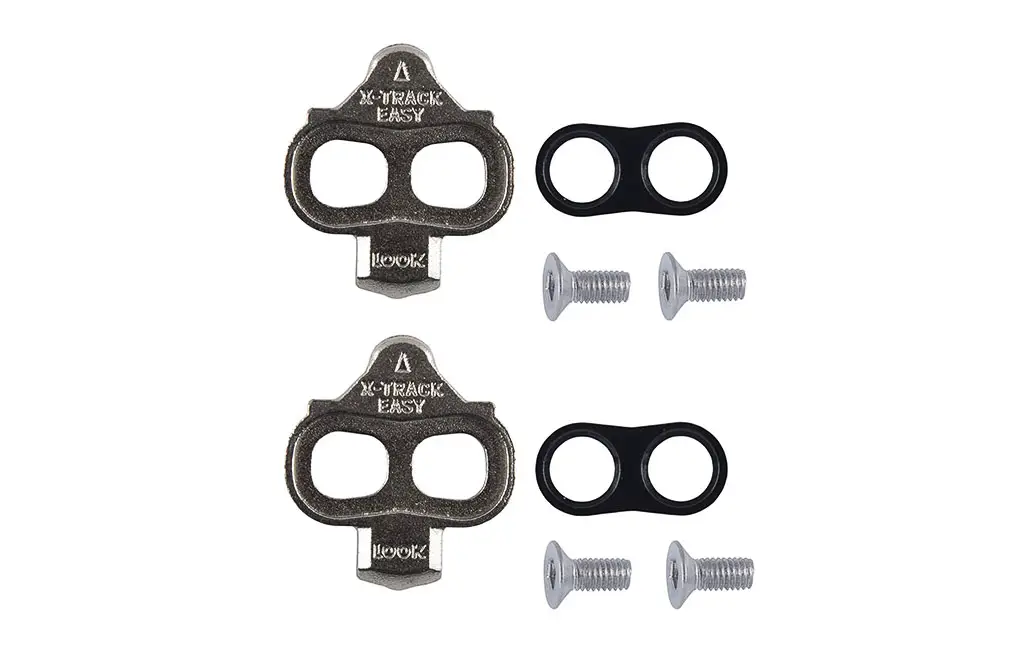
Look offers an “Easy Cleat” just as it did with the S-Track. Consider it the equivalent of the SH-56 Multi-Release cleat.
The X-Track Pedals in Use:
First things first. Clipping in with your old shoes and cleats is a no-brainer. Shimano SH-51 (single release cleats) are completely compatible, and the clip-in motion is exactly what any Shimano SPD user is familiar with. I mixed shoes with X-Track cleats and Shimano cleats in my testing, and never really thought twice.
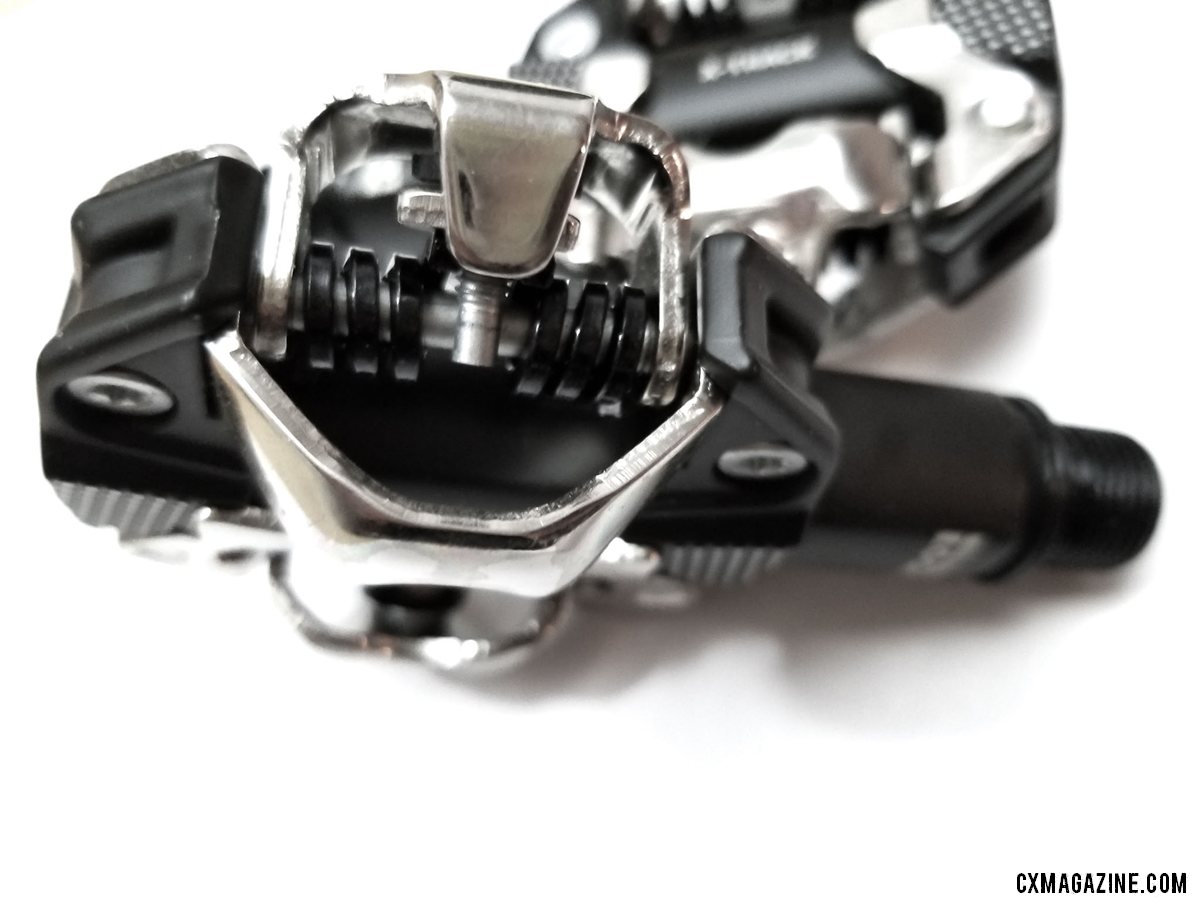
Just as with Shimano SPD pedals, there isn’t any scale to determine spring tension. You can count the # of visible threads however. The Look X-Track mountain bike / cyclocross SPD-compatible clipless pedal. © A. Yee / Cyclocross Magazine
If you like a stable platform, especially with shoes that aren’t the stiffest carbon sole kicks, you’ll like the X-Track pedals. There is plenty of surface area on the pedal, yet it doesn’t interfere with any of the three pairs of shoes I tested the pedals with (Shimano, Lake, Giro). Miss a pedal on a remount and there’s still enough surface area to get you accelerating away while you clip in.
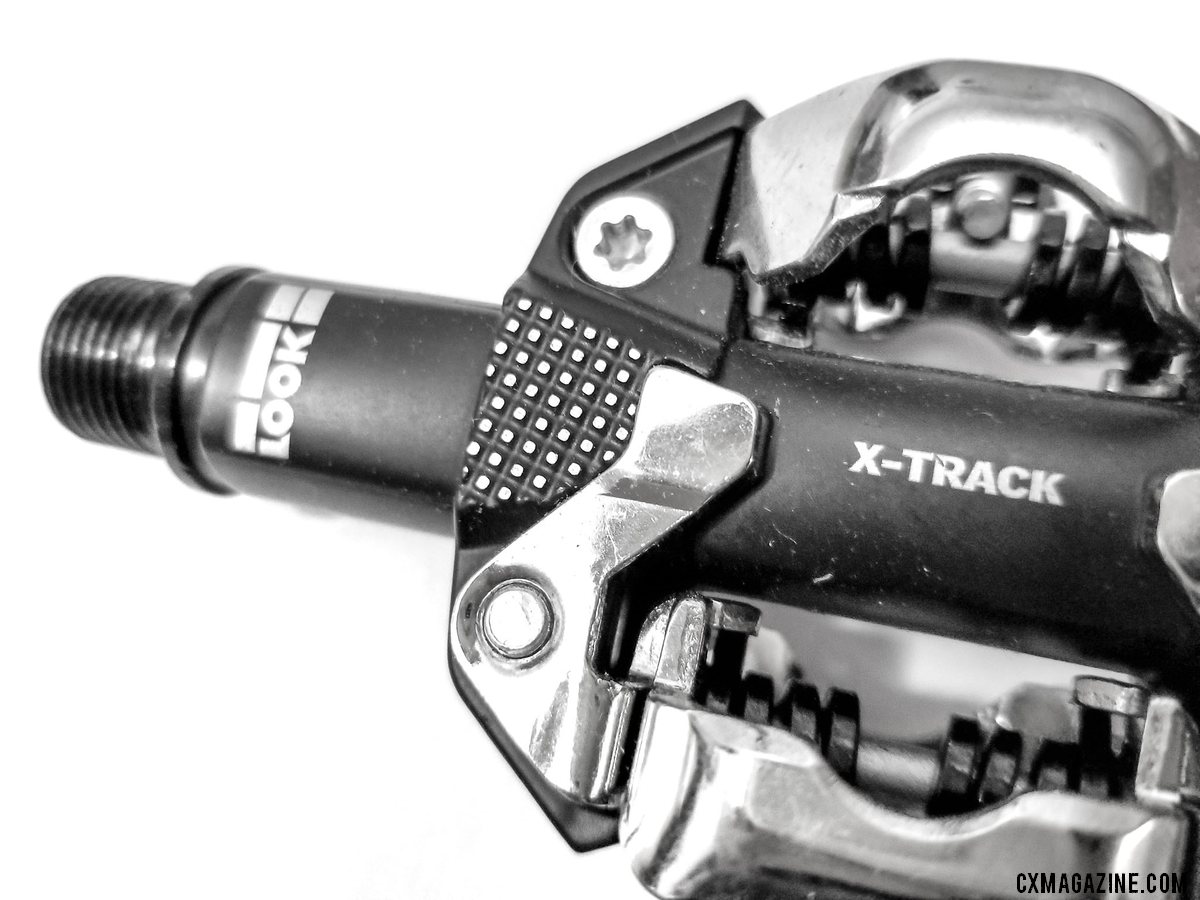
The Look X-Track mountain bike / cyclocross SPD-compatible clipless pedal offers a wide stance and texture for grip. © A. Yee / Cyclocross Magazine
Like Shimano’s SPD pedals, the spring tension is adjustable, and the range of tension seems both wider and higher than what Shimano offers. I’m used to cranking down the spring tension screw on Shimano pedals to avoid accidental unclips, but on the X-Track, max tension is too much. I’ll see if that remains true on really worn cleats or as the pedals wear, but five months in, they’re still secure and positive, whether it’s with Look X-Track or Shimano SH-51 cleats.
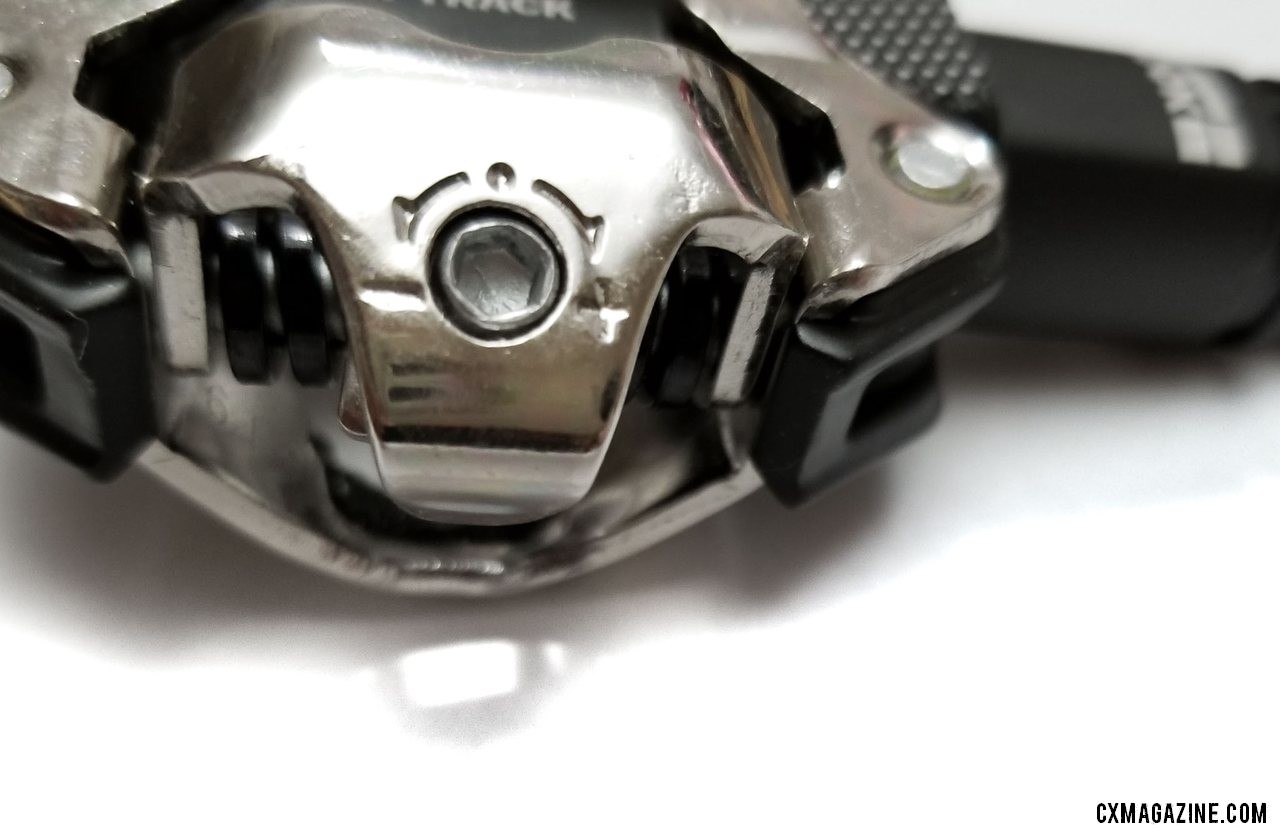
A 3mm Allen key adjusts tension. The Look X-Track mountain bike / cyclocross SPD-compatible clipless pedal. © A. Yee / Cyclocross Magazine
It’s worth noting that at least with the X-Track cleats, I did notice a small increase in float. I welcome that increase in most situations, but in a silly stair-riding attempt, I think the increased angle caught me off-guard, and then on-the-ground. Even with Shimano cleats, I feel there’s a slight increase in float compared to a Shimano pedal, and may pick up a protractor or angle finder to really verify the difference (if any).
After trying to clarify whether the cleat or pedal determines the degree of float, Look said the cleat determines it, suggesting its X-Track cleats offer more float, and just might be an option to add more float to your existing Shimano SPD pedals. Yet another thing to actually measure in further testing.
However, whether it’s because of a small increase in release angle and float, increased spring tension or slightly tweaked claws, I have appreciated a secure pedaling experience, without accidental releases. This applies to both the X-Track and the X-Track Race Carbon models.
The X-Track in the Mud
Mother Nature gifted the West Coast with a wet winter and spring, and I was fortunate to have ample testing opportunity to verify the X-Track’s ability in the mud.
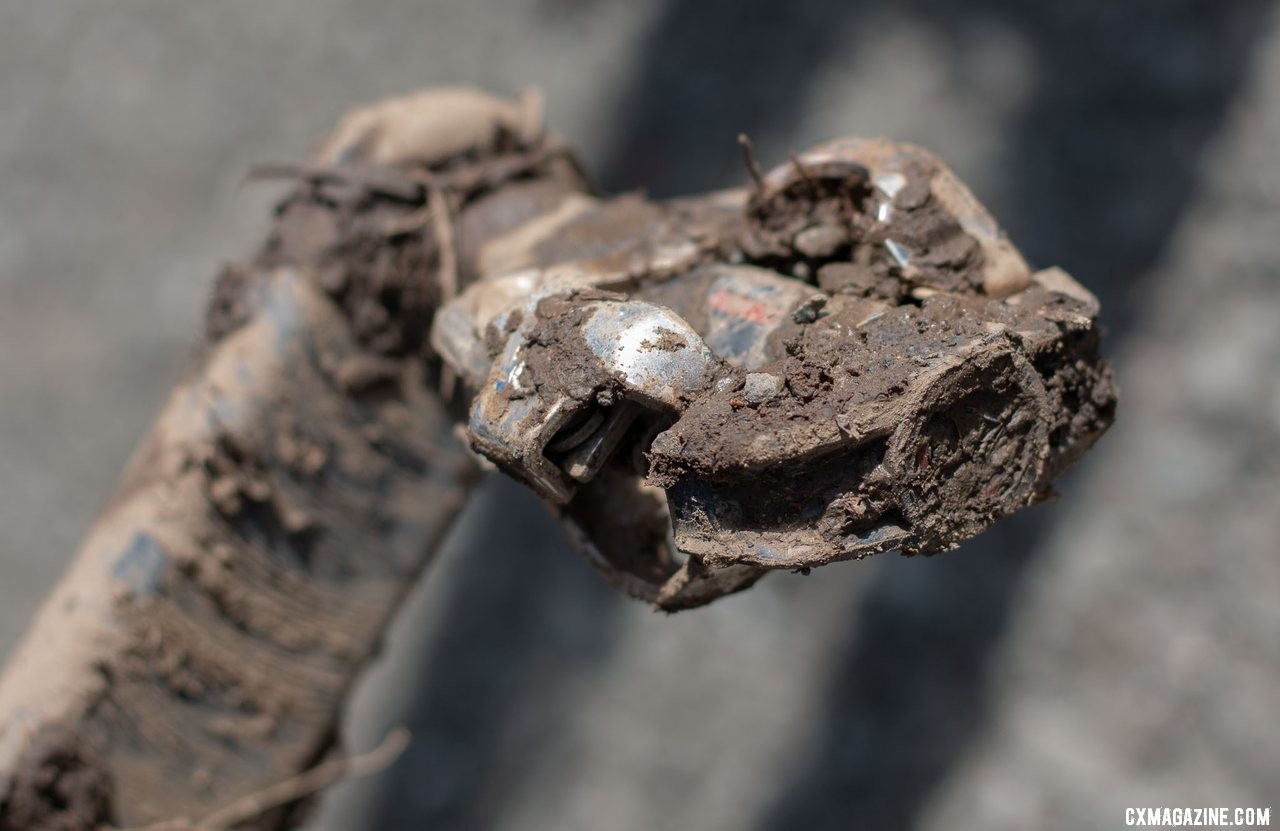
The Look X-Track Race pedals have performed well in the heaviest mud, in the USA, and under Wout van Aert, in Europe.
In two mud-heavy races, I didn’t experience any trouble clipping in or out due to mud. The pedal itself has quite a bit of surface area, which offers more of a platform for organic material to collect, yet it didn’t stop me from clipping in, and performed as well if not better as the M8000 Deore XT pedal from Shimano.
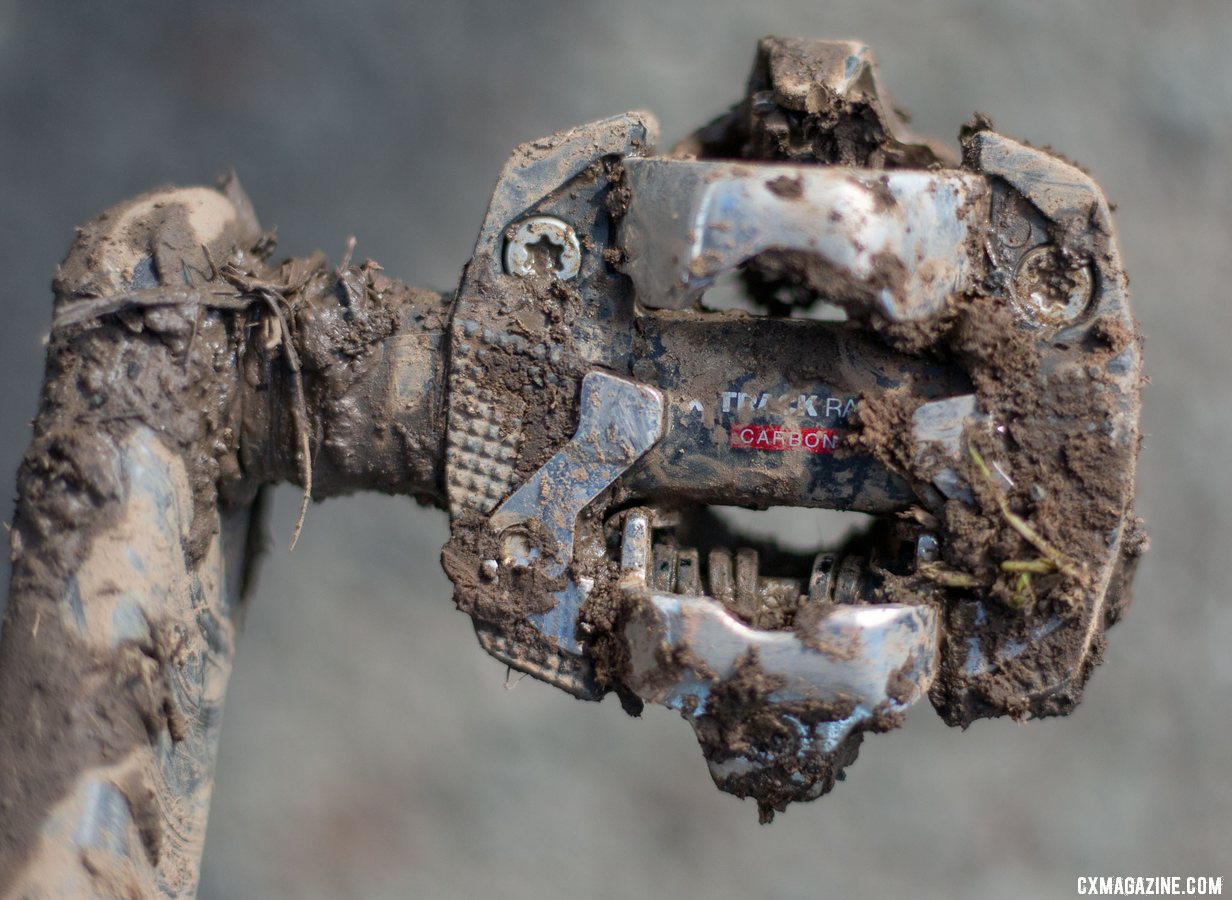
The Look X-Track Race pedals have performed well in the heaviest mud, in the USA, and under Wout van Aert, in Europe.
How can I be so sure? I used one of each during one muddy race. Immediately after the race, I compared the two pedals.
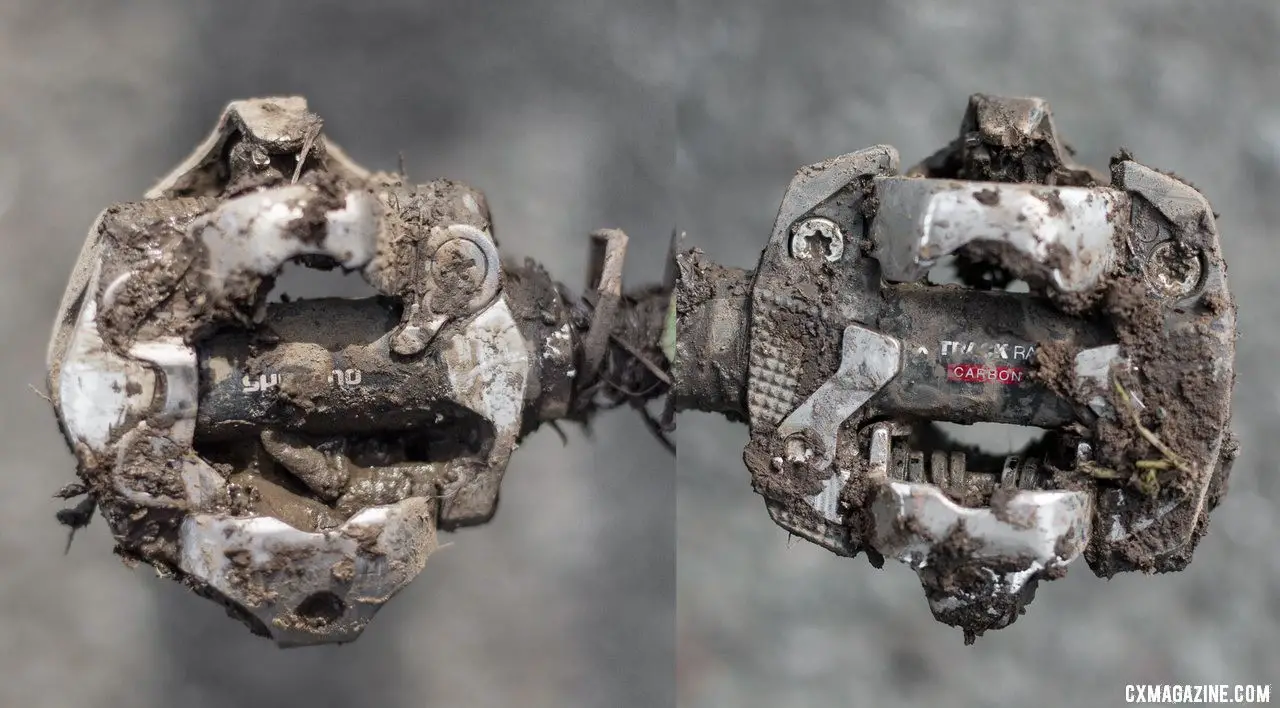
The Look X-Track Race Carbon mountain bike / cyclocross SPD-compatible clipless pedal compared to a Shimano M8000 XT SPD Pedal. Similar surface area, but the X-Track might have better mud clearance around the rear claw. © A. Yee / Cyclocross Magazine
Although I can’t say I noticed it while racing, it looks like the XT pedal retained a bit more organic material and mud around the rearward claws. The X-Track’s metal claw looks to be lower in profile in this spot, and tapers more dramatically by the spring tension screw. Could that be why? We are of course talking about a data sample of one.
Look and fans can also point to Wout van Aert’s success in the heaviest of conditions in European cyclocross racing, but he has the luxury of swapping bikes as frequently as twice a lap. I didn’t swap once, in an hour of racing.
I did not test the pedals in peanut butter-type mud or frozen slush, conditions that are often the downfall of most offroad pedals.
The X-Track Verdict:
I’ve been known to buy Shimano M520 pedals when I need new cleats, because it’s almost like getting spare free pedals with cleats, and those pedals inevitably find their way onto my bikes. I’ve also got bikes with M535, M959, M520, M540, M505 and various iterations of XT and XTR pedals, with a Ritchey XC thrown in, and rarely think about it unless it gets muddy. All have been relatively bombproof.
When it gets muddy, I’ve preferred the Xpedo CXR and older M959 and M970 pedals. Both Shimano models were prior to Shimano’s emphasis on stability and surface area, and the Xpedo is even smaller, but with stiff shoes, I’d pick mud clearing over surface area on sloppy days.
Look’s new X-Track pedals, especially its $60 entry-level model, might throw a wrench in my pedal hierarchy. With a bit more wiggle room (literally), impressive mud clearance and a stable platform, there’s less compromise in picking one pedal.
With its new X-Track, Look appears on track to finally have a winning off-road pedal with staying power.
I’m sure over time I’ll need a rebuild kit to keep the X-Track spinning, but given Look’s offroad pedal history, there wasn’t much demand for such items.
I’m optimistic with the fully-Shimano-compatible X-Track, that will change.
Look X-Track MTB / Cyclocross Clipless Pedal Specs:
MSRP: $60 X-Track; $130 X-Track Race Carbon ($90 Race, $270 Race Carbon Ti)
Float: 6 degrees total
Bearings: Two cartridge ball bearings, one bushing
Weight: 392 grams actual, X-Track, 351 grams actual, X-Track Race Carbon
More info: LookCycles.com
Look X-Track SPD-Compatible Pedal Photo Gallery:










